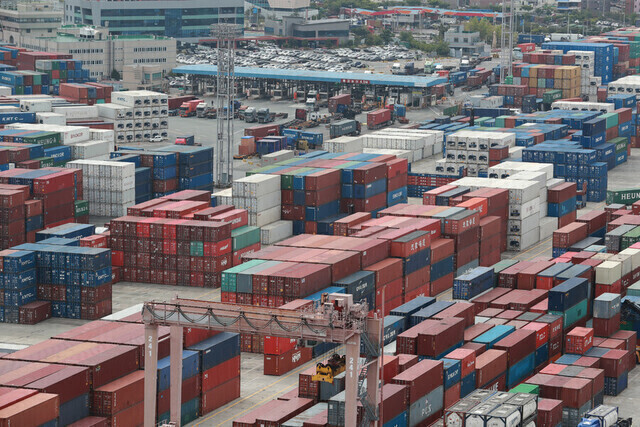hankyoreh
Links to other country sites 다른 나라 사이트 링크
Fitch maintains S. Korea’s “AA-” credit rating with stable outlook

Fitch Ratings, an international credit rating company, announced on Wednesday that it would be maintaining South Korea’s national credit rating at AA- with a “stable outlook.”
AA- is the fourth highest among the Fitch ratings. The UK, Belgium, Ireland and Hong Kong all currently rank the same as South Korea, which has maintained this rating for 10 years, since September 2012.
According to Fitch predictions, South Korea's real economic growth rate will reach 2.6% this year and 1.9% in 2023.
“The sharp slowdown in global growth, along with consumption-switching to services, will weigh on Korea's exports and facilities investment,” Fitch stated.
The domestic consumer price index inflation figures were also forecasted to decline to around 5.0% by this year end and 1.5% by the end of 2023.
The current upward trend is expected to slow in the future due to weakening raw material prices and monetary tightening measures.
Meanwhile, the forecast for the debt-to-GDP ratio for 2025 has been lowered from 58.6% to 51.5%.
When Korea’s rating was first announced in January, Fitch had pointed out that the increase in national debt would be a factor for a medium-term downturn. However, this time around, the debt outlook has been improved and it is estimated that downgrade factors will be eased.
“Fitch believes Korea's external finance position provides a sufficient buffer to manage the current bout of external volatility,” the company stated.
In other words, despite recent trade deficits and the decrease in foreign exchange reserves, Korea is maintaining good external soundness “due to Korea’s strong net external creditor position and history of persistent current account surpluses.”
Fitch also explained that Korea's foreign exchange reserves “remain sound compared with peers,” recording about six months of current external payments in 2022 (median for AA countries is 2.2 months).
Fitch cited a significant rise in government debt to GDP, economic or financial sector distress resulting from impaired household debt-servicing ability, and a rise in geopolitical risks on the Korean Peninsula as factors that could lead to a downgrade in Korea’s rating.
On the other hand, a structural easing of geopolitical risks, improved governance standards, and continued current account surpluses that contribute to a sustained improvement in the net external creditor position were cited as factors that could help Korea upgrade its current rating.
Regarding the current financial situation, South Korea’s Ministry of Economy and Finance said, “The government will work to strengthen communications with global credit rating agencies such as Fitch to enhance the county’s creditworthiness and actively address some concerns about fiscal burdens caused by an ageing society and household debts by attending talks with global rating agencies before and after the G20 Finance Ministers and Central Bank Governors’ Meeting.”
By Park Jong-o, staff reporter
Please direct questions or comments to [english@hani.co.kr]

Editorial・opinion
![[Column] Season 2 of special prosecutor probe may be coming to Korea soon [Column] Season 2 of special prosecutor probe may be coming to Korea soon](https://flexible.img.hani.co.kr/flexible/normal/500/300/imgdb/original/2024/0426/3317141030699447.jpg) [Column] Season 2 of special prosecutor probe may be coming to Korea soon
[Column] Season 2 of special prosecutor probe may be coming to Korea soon![[Column] Park Geun-hye déjà vu in Yoon Suk-yeol [Column] Park Geun-hye déjà vu in Yoon Suk-yeol](https://flexible.img.hani.co.kr/flexible/normal/500/300/imgdb/original/2024/0424/651713945113788.jpg) [Column] Park Geun-hye déjà vu in Yoon Suk-yeol
[Column] Park Geun-hye déjà vu in Yoon Suk-yeol- [Editorial] New weight of N. Korea’s nuclear threats makes dialogue all the more urgent
- [Guest essay] The real reason Korea’s new right wants to dub Rhee a founding father
- [Column] ‘Choson’: Is it time we start referring to N. Korea in its own terms?
- [Editorial] Japan’s rewriting of history with Korea has gone too far
- [Column] The president’s questionable capacity for dialogue
- [Column] Are chaebol firms just pizza pies for families to divvy up as they please?
- [Column] Has Korea, too, crossed the Rubicon on China?
- [Correspondent’s column] In Japan’s alliance with US, echoes of its past alliances with UK
Most viewed articles
- 1Samsung subcontractor worker commits suicide from work stress
- 2‘We must say no’: Seoul defense chief on Korean, USFK involvement in hypothetical Taiwan crisis
- 3Is Japan about to snatch control of Line messenger from Korea’s Naver?
- 4Division commander ordered troops to enter raging flood waters before Marine died, survivor says
- 5[Editorial] Korea’s surprise Q1 growth requires objective assessment, not blind fanfare
- 6No good, very bad game for Korea puts it out of Olympics for first time since 1988
- 7US overtakes China as Korea’s top export market, prompting trade sanction jitters
- 8Korea’s 1.3% growth in Q1 signals ‘textbook’ return to growth, says government
- 9N. Korean delegation’s trip to Iran shows how Pyongyang is leveraging ties with Moscow
- 10[Column] Season 2 of special prosecutor probe may be coming to Korea soon